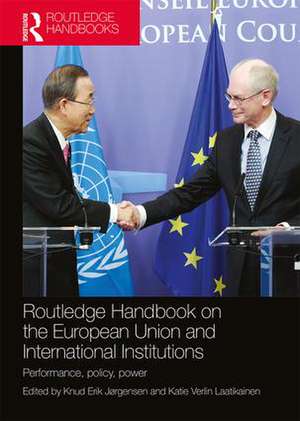Routledge Handbook on the European Union and International Institutions: Performance, Policy, Power
Editat de Knud Erik Jørgensen, Katie Verlin Laatikainenen Limba Engleză Paperback – 30 iun 2017
This Handbook addresses an increasingly contested issue of profound political importance: Europe’s presence in multilateral institutions. It assesses both the evolving role of Europe in international institutions, and the transformations in international institutions themselves. Acknowledging that the category of international institutions comprises a highly diverse field of multilateral engagements, this Handbook presents a state of the art approach that analyzes both what we have learned about the EU and international institutions as well as identifying promising avenues for further research. The Handbook is divided into six parts:
- Part I examines the EU’s diplomatic and legal personality in international relations that constitutes the internal foundation for the EU’s engagement with international institutions.
- Part II assesses how EU multilateralism intersects with other international institutions and provides a means to assess the performance of international institutions as well as the EU itself in multilateral processes.
- Part III focuses on the EU’s participation with key institutions within the general UN system, such as the UN General Assembly and Security Council as well as specific policy domains such as human rights across UN institutions.
- Part IV focuses on EU relations with wide range of international organizations in a variety of fields, from organizations in economic and security realms to environmental institutions and specialized agencies.
- Part V focuses on the EU’s engagement in a broad spectrum of issue-specific international agreements and international regimes, addressing issues such as non-proliferation of WMDs, climate change, information technology, and the emerging Gx-system (G7, G8, G20 etc).
- Part VI examines broader contextual factors that influence the relationship between the EU and international institutions, including the evolution of multilateralism, the trans-Atlantic relationship, global norms and the emergence of multipolarity.
Preț: 345.92 lei
Preț vechi: 390.62 lei
-11% Nou
Puncte Express: 519
Preț estimativ în valută:
66.21€ • 71.95$ • 55.65£
66.21€ • 71.95$ • 55.65£
Carte tipărită la comandă
Livrare economică 21 aprilie-05 mai
Preluare comenzi: 021 569.72.76
Specificații
ISBN-13: 9781138306844
ISBN-10: 1138306843
Pagini: 512
Ilustrații: 3 Line drawings, black and white; 13 Tables, black and white; 3 Illustrations, black and white
Dimensiuni: 174 x 246 x 38 mm
Greutate: 0.82 kg
Ediția:1
Editura: Taylor & Francis
Colecția Routledge
Locul publicării:Oxford, United Kingdom
ISBN-10: 1138306843
Pagini: 512
Ilustrații: 3 Line drawings, black and white; 13 Tables, black and white; 3 Illustrations, black and white
Dimensiuni: 174 x 246 x 38 mm
Greutate: 0.82 kg
Ediția:1
Editura: Taylor & Francis
Colecția Routledge
Locul publicării:Oxford, United Kingdom
Public țintă
Postgraduate and UndergraduateCuprins
Introduction Knud Erik Jørgensen and Katie Verlin Laatikainen PART I: The EU IN INTERNATIONAL INSTITUTIONS 1. Form and Substance in the EU’s Multilateral Diplomacy Simon Duke 2. EU Delegations: Europe’s Link to the World Eric Hayes 3. The EU’s Diplomatic Machinery Caterina Carta PART II: APPROACHES: INTERNATIONAL ORGANIZATIONS AND PERFORMANCE 4. Analyzing the Performance of International Organizations Tamar Gutner and Alexander Thompson 5. Inter-organizational Approaches Joachim A. Koops 6. Analyzing the Performance of the European Union Knud Erik Jørgensen 7. Evaluating Diplomatic Performance in International Institutions Niels van Willigen and Yvonne Kleistra PART III: THE UNITED NATIONS 8. The European Union in UN Politics Caroline Bouchard and Edith Drieskens 9. The EU and the UN Security Council Reform Debate: A Missed Opportunity or a Blessing in Disguise? Spyros Blavoukos and Dimitris Bourantonis 10. The United Nations Role in Preserving Peace: Effectiveness of Multilateralism in Question Joachim Krause 11. The Responsibility to Protect Tonny Brems Knudsen 12. The Role of Judges Confronted with Norms form Different Origins: The Case of Counter- Terrorist Sanctions Christina Eckes 13. The study of the EU promotion of human rights: the importance of international and internal factors Giuseppe Balducci PART IV: INTERNATIONAL ORGANIZATIONS 14. The EU at the World Bank: institutional and policy performance Eugenia Baroncelli 15. The International Monetary Fund Jan Wouters and Sven van Kerckhoven 16. The International Telecommunication Union Jamal Shahin 17. The OECD Peter Carroll and Ansley Kellow 18. EU-NATO Relations Nina Græger and Kristin Haugevik 19. OSCE David Galbreath and Malte Brosig 20. Global Environmental Institutions Lisanne Groen and Sebastian Oberthür PART V: INTERNATIONAL REGIMES 21 The European Union and International Regimes Mike Smith and Ole Elström 22. The European Union in the Gx System: representation and coordination Peter Debaere and Jan Orbie 23. Factors shaping the effectiveness of EU external economic policies Steven Woolcock 24. The Performance of the EU in the International Institutional Landscape of the Internet George Christou and Seamus Simpson 25. The European Union and the Climate Change Regime Louise van Schaik 26. The Good, the Bad and the European: The EU and the Global Non-Proliferation Institutions Benjamin Kienzle and Cindy Vestergaard 27. Regulating the Private Military and Security Industry: A European Security Governance Response Åsne Kalland Aarstad PART VI: GLOBAL INSTITUTIONAL CONTEXTS AND EU MULTILATERALISM 28. The European Union and Multilateralism: Touchstone or Millstone? Robert Kissack 29. When Multilateralism Hits Brussels: The Influence of International Institutions on the EU Oriol Costa 30. Perceptions of the EU in International Institutions Sonia Lucarelli 31. Two-Track Realism: Transatlantic Cooperation in Fighting Terrorism Annegret Bendiek 32. Global Norms and European Power Lisbeth Aggestam 33. EU Multilateralism in a Multipolar World Katie Laatikainen
Descriere
This Handbook addresses the increasingly contested issue of profound political importance: Europe’s presence in multilateral institutions. It assesses both the evolving role of Europe in international institutions, and the transformations in international institutions themselves.
